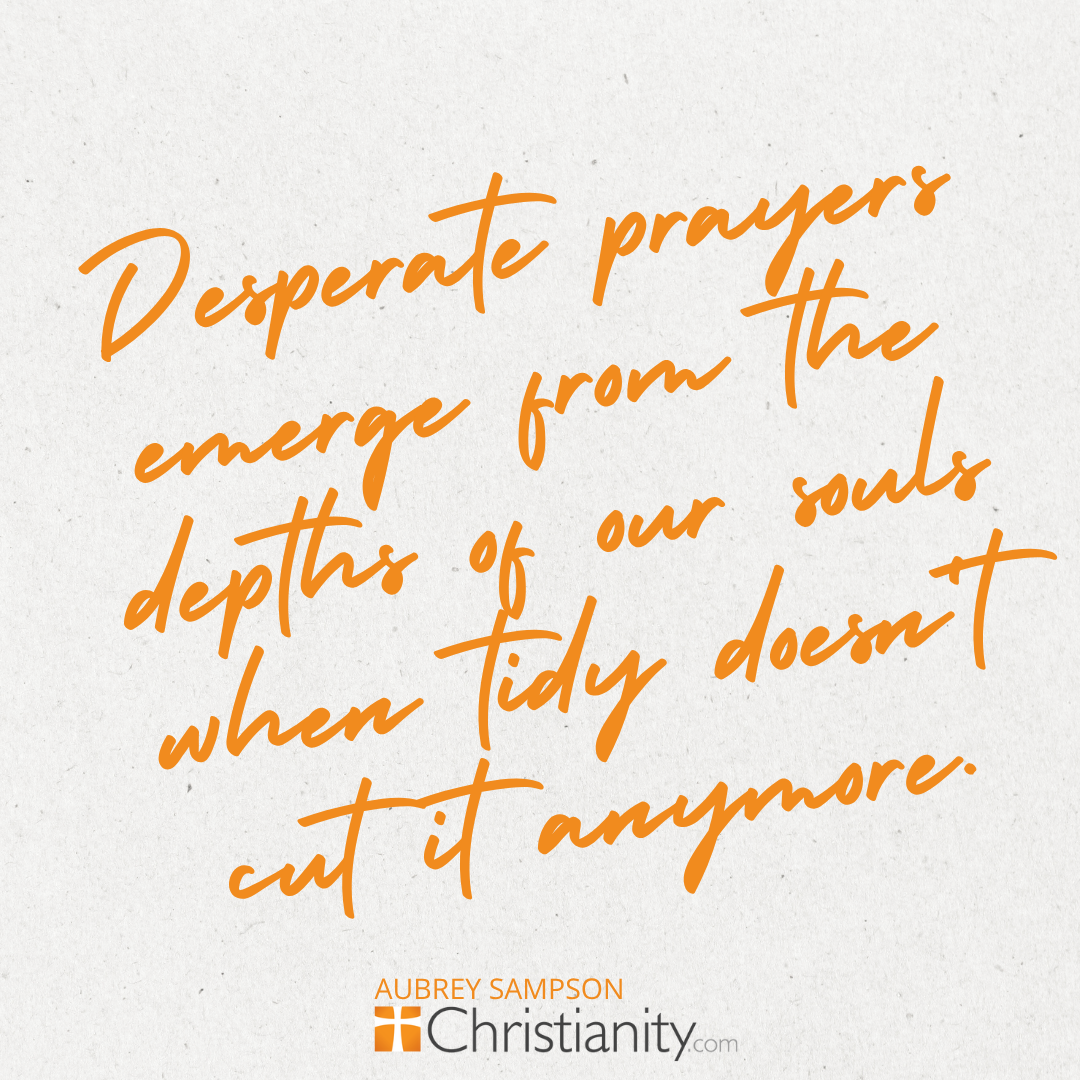When polite prayers aren't enough, we learn to pray like our lives depend on it ...because they do.
I used to pray very politely. My prayers were well-structured, theologically sound, and appropriately reverent. I covered all the bases: adoration, confession, thanksgiving, supplication. I journaled perfect prayers that were ordered and tidy.
That changed the night I found myself pulling over on the side of the road, no longer able to drive, because I was sobbing prayers that had no structure, and definitely no reverence. My heart felt lifeless. I was battling grief from losing my best friend to cancer and going through a season of doubt and anger at God, so much so that praying each day felt empty, rote, meaningless, pointless, even. That night, in my car, I could no longer be polite. I begged. I pleaded. I screamed at God.
It was the most honest prayer I'd ever prayed. (My crying in the car prayers are usually my most honest.) It was also a picture of what the Bible calls "desperate prayers" or laments—impolite pleas—the kind of guttural prayers that emerge from the depths of our souls when tidy doesn't cut it anymore.

The Tradition of Desperate Prayer
Scripture is full of desperate prayers. Hannah prayed so intensely for a child that the priest thought she was drunk. David cried out to God from caves and battlefields, his prayers raw with fear and frustration. Job argued with God for chapters, demanding answers and refusing to accept easy explanations for his suffering.
Jesus himself prayed desperately in the Garden of Gethsemane, sweating drops of blood as he begged his Father to find another way. If the Son of God needed to pray desperately, how much more do we?
These weren't failures of faith—they were intimate expressions of it. Desperate prayers reveal not weakness, but strength as we recognize the only place, the only One, who has the power to strengthen us in our desperation.
When Desperation becomes Invitation
Desperation isn't the opposite of faith; it's so often the birthplace of it. When we're desperate, we strip away the pretense and performance. We can no longer afford to pray what we think we should pray—we can only pray what we actually feel.
This is a little terrifying for those of us who have been taught that our prayers should be neat and tidy, that we should come to God with our spiritual ducks in a row. But desperation has a way of revealing that our ducks were never in a row to begin with, and that's actually very good news—it reminds us how desperately we need God. We are desperate; we might as well pray desperately and honestly.
When I was in the car that night, I couldn't recite Scripture or use theological language. I could only say, "God, come find me. I can’t do this." To be honest, I didn’t even have actual words; I had groans, tears, and screams. And I encountered the presence of God in a way I never had before—comforting me, letting me know He sees me.
The Honesty God Desires
God doesn't need our prayers to be polished. He knows our hearts before we speak anyway. What he desires is honesty—the kind of raw, unfiltered honesty that only comes when we're too desperate to pretend anymore. He’d rather we come to him with anger, rawness, even rage, than walk away or be numb from apathy. God wants our whole hearts, which means he wants our desperation, too. And he wants to meet us in our darkest valleys with his comfort.
I think about the Syrophoenician woman who approached Jesus begging for her daughter's healing. When Jesus initially seemed to dismiss her, she didn't politely accept his response and walk away. She argued with him. She pressed in. She refused to take no for an answer. Jesus didn't rebuke her desperation, he commended her faith.
Or consider the persistent widow in Luke 18 who kept showing up at the judge's door, demanding justice. She was shameless, audacious even, in her desperation, and Jesus held her up as an example of how we should pray. Not politely, not occasionally, but persistently and desperately.
These women model for us a beautiful example of faithful, desperate prayer.
Desperate Prayers and Intimacy with God
It was hard to realize this at the time, but as I look back over my spiritual life, some of my most significant spiritual breakthroughs have come in moments of desperation ...driving alone in my car, as I mentioned, crying in the shower, crumpled on my bedroom floor due to grief, loss, or other disappointments. There's something about being pushed to our limits that strips away the layers of self-reliance and forces us to depend completely on God. I’m always reminded, in those seasons, that God works in the deepest places of our souls; God refuses to let us stay shallow.
When our prayers are too comfortable, I wonder if we are praying to perform, rather than to invite God's transformative power into our lives. Are we praying to impress? Are we praying to go through the motions, rather than depend, seek, and develop intimacy with God?
I get it. It’s hard to even want to pray desperately, because that kind of crying out is uncomfortable. It requires us to admit our helplessness and limitedness, to acknowledge our need, to confess that we don't have it all figured out. Desperate prayers demand vulnerability in a culture that prizes strength and certainty.
But this discomfort is where we learn that God's strength is made perfect in our weakness, this is how we “prove” God, as the scriptures say – how we learn to trust that His grace is sufficient for our struggles, that His love doesn't depend on our ability to pray perfectly.
When my dad died unexpectedly last year (on the anniversary of my best friend’s death), a friend of mine prayed desperate prayers on my family’s behalf. She would leave me voice memos of those prayers, and the fact that she never discounted my pain, but leaned into it, brought so much healing to my soul. Her desperation became a form of spiritual encouragement to me. Her prayers empowered me to cling to God when I was tempted to avoid him.
4 Pathways to Desperate Prayer
If you are in a desperate place, first of all, I am so sorry for whatever got you here. Please know you are not alone. But I also know this is God’s invitation for you to grow in intimacy and authenticity with Him. So, how do we learn to pray desperately? Here are four places to start:
1. Give yourself permission to be honest with God about your real needs, real fears, and real struggles. Stop trying to impress God or pretend. Start being real with Him about your spiritual poverty, doubts, and struggles.
2. Desperate prayer might mean abandoning the prayer structures you've been taught and finding your own words or praying someone else’s words, or sometimes having no words at all. Some of my most powerful prayers have been wordless groanings, or crying out, “How long, Oh Lord! I can’t take anymore!” Or even journaling, “God, where are you?” Desperate prayer, for me, has been a walk through an arboretum while crying tears. Or it’s meant to pray the lament Psalms aloud, or read liturgical prayers written by other grievers, especially when I don’t have my own words. I am so grateful for the breadth of prayer resources from faithful Christians before me. We can borrow each other’s faith in this way.
3. Be persistent. Desperate prayers don't usually get answered immediately. They require us to keep showing up, keep asking, keep seeking, keep knocking (see Luke 11). This persistence teaches us that prayer is not a transaction but a relationship, not a formula but an ongoing conversation. Persistence in prayer isn't about wearing God down or changing His mind; again it’s not about performance—it's about our own transformation through the process, and about a deeper intimacy with Him.
4. Learn to pray with your whole self, not just your mind or words, but your heart, your body, your emotions. Sometimes desperate prayers require us to pace, to weep, to shout, to lie prostrate on the floor. There's no wrong way to pray desperately.
When we learn to pray desperately, several things happen. We develop a deeper intimacy with God because we're bringing our real selves to Him rather than our performed or polished selves. We experience God's faithfulness in new ways because we're depending on Him in new ways. We become more compassionate toward others because we know what it's like to be desperate ourselves.
Most importantly, we learn that God is not offended by our desperation—He's moved by it. He doesn't want us to clean up our prayers before we bring them to Him any more than a parent wants their child to clean up their scraped knee before seeking comfort.
The night I prayed desperately on the side of the road marked an important moment in my spiritual life. Not because God immediately fixed everything I was praying about—some of it is still not “fixed,” even years later. But I know God could handle my desperation. I learned that He wanted my honesty more than my eloquence, my heart more than my carefully constructed spiritual façade.
If you're in a season where polite prayers aren't enough, I want to give you permission to pray desperately. Bring your real needs, your real fears, your real self to God. He's not waiting for you to get it together before you come to Him—He's waiting for you to come to Him so He can help hold you and your needs. He will meet you with love.
Photo Credit: ©Getty Images/Cecilie_Arcurs



.jpg)

